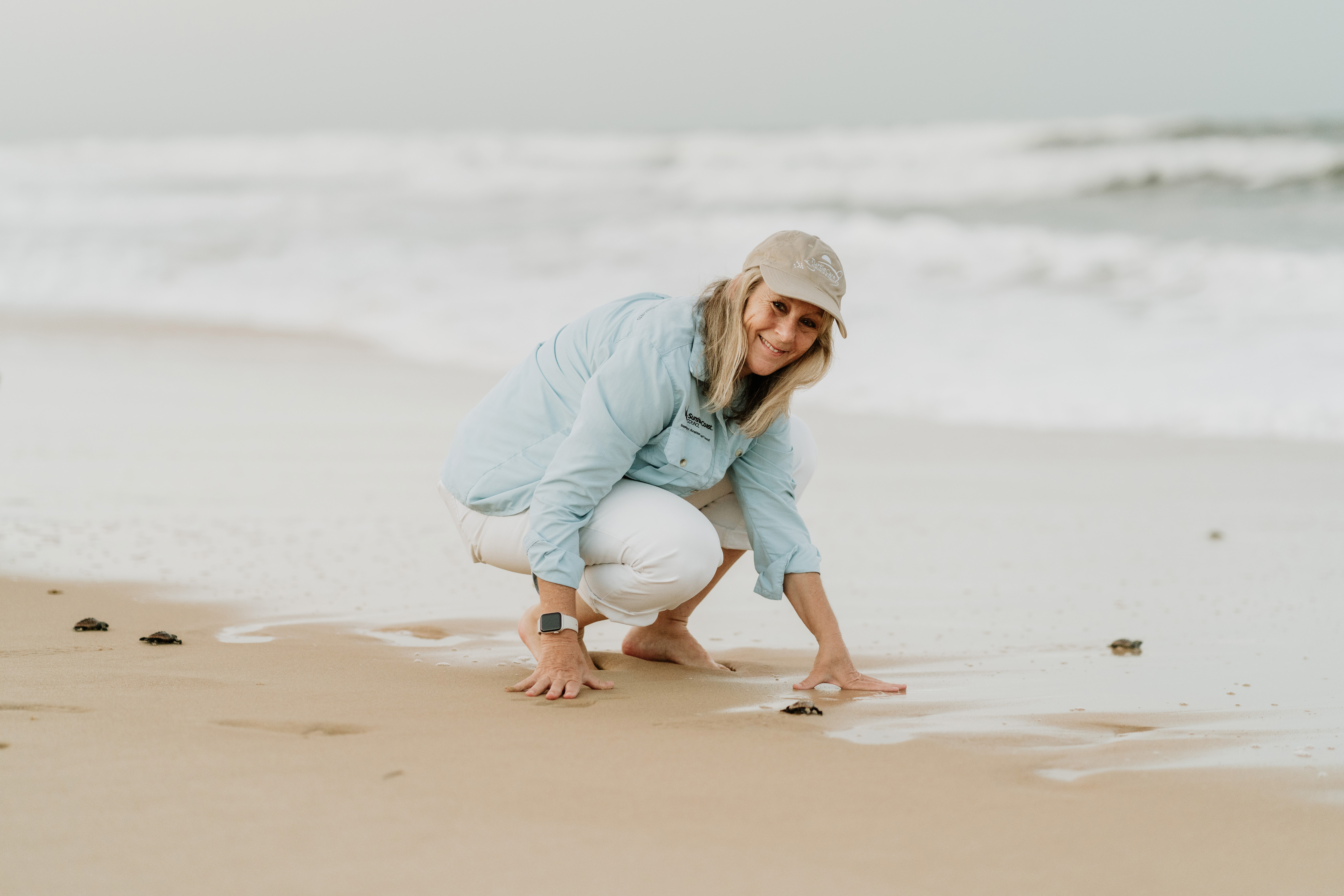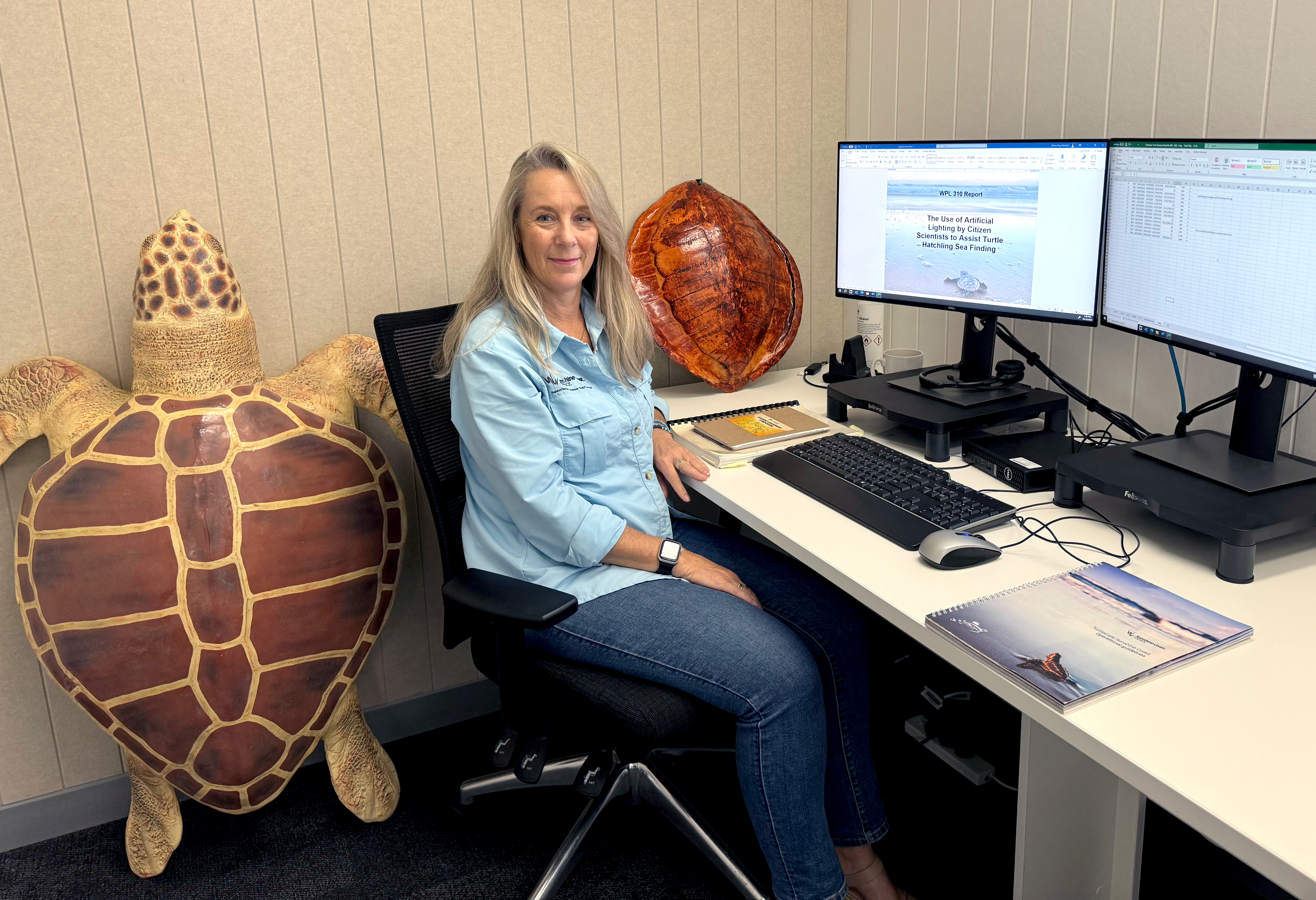Sharon Jones never thought "in a million years" she was clever enough to go to uni. But now at 60, she's hatching a brand new career in animal ecology while living her dream as a TurtleCare volunteer.
South-African born Sharon has had a varied, changeful life so far, but the one consistency has always been her passion for tourism and a genuine love of animals.
So when COVID-19 annihilated her work as a travel agent, she knew it was time to take a bold plunge into the adventure of a lifetime; enrolling in a university degree at the perfect age of 57.
Now 60, Sharon's in her third year of a Bachelor of Animal Ecology degree at the University of the Sunshine Coast (UniSC).
"I'd never been to uni before, I never thought in a million years I was clever enough for that, but I had done two TAFE diplomas in travel, tourism and events and was actually applying for a job in England when COVID happened, and then all that changed," she says.
Having left the workforce early on in her career to dedicate 18 years to raising a family, Sharon was ready to do something just for her.
"I had also gone through some upheaval in my personal life, and was at a crossroads," she says.
"I thought, 'What am I going to do now? Well, maybe I'll go and study and pursue my passion,' so I went and called UniSC to find out how to enroll."
“It was very daunting, in the beginning. I was full of self-doubt and would often think, ‘What am I doing here… don't be so stupid Sharon, just go and get a normal job.’ But I stuck with it and persevered and it's been the best thing I've ever done."
When Sharon enrolled in the degree, she met with the careers team at UniSC who took into account her diplomas, and her work experience after so many years in the industry. As a result, she got six electives taken off due to Recognition of Prior Learning (RPL), which took a whole year off her study requirements.
"I love it... it’s such a great degree and the teaching staff are incredibly supportive, and we get to do some amazing field trips, like the one we just did to Heron Island," she says.
“I’ve made fabulous friends and found people who align with my values. We pool our resources together and just help each other out. That's the key thing for me.”
"I think at the end of the year when I graduate, I'll be really sad to be finished... though I envision when I walk across that stage I’m gonna raise my fist and go, ‘YEAH! I did it.'"
During Sharon’s first year of uni, she was introduced to TurtleCare Sunshine Coast, a community-based citizen science program coordinated through Sunshine Coast Council that monitors and protects nesting marine turtles.
"The work they did really spoke to me, so I signed up as a volunteer straightaway," she says.
"One day, Kate Hofmeister who runs TurtleCare approached me and said, ‘Why don't you do your student placement through us?’ It was perfect, it felt so natural and I felt I was doing something truly important."
Sharon spent a semester doing her Workplace Learning (WPL) with TurtleCare at the Sunshine Coast Council. Her job involved data analysis which she will now use to prepare a report for the Council.
"After hatchlings emerge from the nest, typically during nighttime, they may become disoriented by street or house lights as they make their way to the ocean. Volunteers often use low-light torches to guide these hatchlings safely down the beach towards the ocean," she says.
“Placement is so important because you get to go out there and see how it works in the real world. My placement has been doing what I love, being back out in the business world but doing something truly meaningful.”
"For my placement I analysed data sheets from 2017 to see where volunteers assisted the turtle hatchlings into the sea with torches. There were a lot of data sheets to analyse, but it was a very enlightening experience.
“They are a threatened species, especially the loggerhead, so knowing I’m helping in any small way is meaningful. Only one in 1,000 hatchlings actually makes it to adulthood, so you want to protect them with everything you got.
"The hatchlings we are seeing now are only going to come back in 30 years’ time… I might not even be alive by then, but the impact of what I'm doing now is going to help future populations."
Sharon finished school in 1981, before the technology age, and says she didn't do maths at school, so it's been a "huge learning curve."
"Here I am doing statistics and using Zoom and Google scholar and academic writing and referencing… I still doubt myself now, but hey, I got 94 percent for my last exam, so I'm alright with that!”
“It’s rising to the challenge, having that belief in myself that, yes, I can do it.
"I've literally been told in the past, ‘You're no good, you're not smart enough.’ Well, it's my little challenge that I am smart enough. It's not proving it to anyone else, it's just proving it to me that I can do it.”
Making life at uni even more special is the fact that both Sharon's sons studied at UniSC during the same time as her.
"It was so special having Michael and Wesley on campus with me," she says.
"When they heard I'd enrolled, they were so happy and proud, especially when they saw some of my grades."
“I've had people ask me, ‘Why are you going to uni at your age?’ And I say, ‘Well, why not?’ You’ve got to challenge people's thinking and change their mindset... but mainly it’s a personal victory, a little feather in my cap, every time I get a high distinction or nail an exam.”
Media enquiries: Please contact the Media Team media@usc.edu.au



